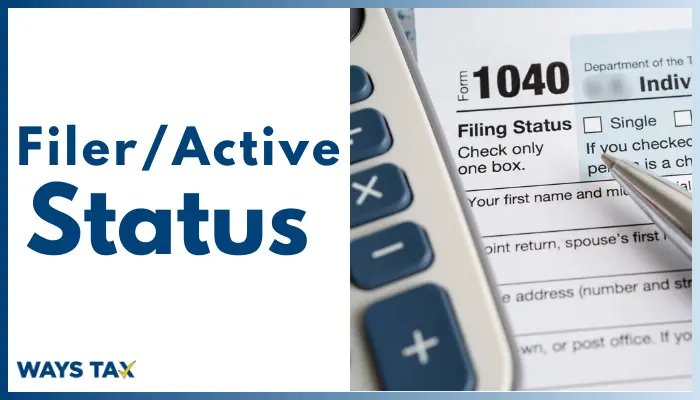
Understand Filer / Active Status With Professional Tax Consultant
One cannot stress how crucial it is to keep your Filer or Active Status in Pakistan. There are several advantages to having your name recorded with the Federal Board of Revenue (FBR) as a filer or active taxpayer, including tax exemptions and discounts.
The Federal Board of Revenue (FBR) has reported a considerable 71% increase in the number of tax return filers, highlighting the importance of compliance.

Attaining and maintaining this status can have a big financial impact on both individuals and businesses. Without expert assistance, though, the process of becoming a filer and making sure your Active Taxpayer List (ATL) status is updated can be daunting.At Ways Tax, our expertise lies in streamlining the tax filing procedure and ensuring your yearly compliance. Here’s why it’s vital for your financial success that you file and keep your Active Taxpayer Status with our assistance.
What is Filer / Active Taxpayer Status?
Those who are listed on the FBR’s Active Taxpayer List (ATL) and who timely file their income tax returns are referred to as filers.
On the other hand, people who do not file tax returns are subject to increased tax rates, limited access to financial services, and further financial penalties. The people and organizations that comply with their tax duties are reflected in the ATL through regular updates from the FBR.
Being on this list comes with significant financial benefits, including:
- Reduced withholding tax on bank transactions, property purchases, vehicle registration, and other financial activities.
- Exemptions or reductions on certain types of taxes and penalties.
- Access to legal financial avenues that are restricted for non-filers.
However, remaining in the ATL is a continuous process. You must file your tax returns every year to keep your filer status. The procedure may be difficult and time consuming, you can consult with a Tax expert.
Who is Eligible for Filer / Active Status
To be eligible for Filer / Active Status in Pakistan, individuals must meet the following criteria:
- Income Threshold: Individuals earning over PKR 600,000 annually are required to file tax returns to qualify as a filer.
- Resident Status: Both residents of Pakistan and non-residents with taxable income in Pakistan must file tax returns.
By meeting these requirements, individuals can attain Filer / Active Status and enjoy benefits such as lower withholding taxes and financial exemptions.
Documents Required for Filer / Active Status in Pakistan
To become a filer and maintain Active Taxpayer Status, the following documents are typically required:
- Computerized National Identity Card (CNIC) – 13 digits.
- National Tax Number (NTN) – 7 digits.
- Proof of Income – Salary slips, business income records, or bank statements.
- Bank Account Details – Necessary for filing returns.
Official Fee for Filer / Active Status
There is no official fee charged by the FBR for becoming a filer. Filing tax returns through the FBR portal is free. Costs may include late penalties if deadlines are missed.
Check Active Taxpayer Status Online
You can verify your Filer or Active Taxpayer Status (ATL) through official government portals:
- Federal Board of Revenue (FBR):
Check Active Taxpayer List (ATL) – FBR Official Portal - Punjab Revenue Authority (PRA):
PRA ATL Search Utility – Check Active Taxpayer Status (Punjab)
These links allow individuals and businesses to confirm their active status before financial transactions, ensuring compliance with FBR regulations.
Finance Act Updates (2018 & 2019)
The Finance Act, 2018 introduced a restriction preventing taxpayers from being included in the Active Taxpayer List (ATL) if they had not filed their tax returns by the due date.
However, under the Finance Act, 2019, this restriction was relaxed. Now, taxpayers who file their returns after the due date can still be included in the ATL by paying a prescribed surcharge. This update was made to encourage voluntary compliance while maintaining fairness for timely filers.

Surcharge for Late Filers
If you missed the due date for filing your Income Tax Return, you can still be part of the Active Taxpayer List by paying a one-time ATL Surcharge as defined in Section 182A of the Income Tax Ordinance, 2001.
| Category | Surcharge Amount (PKR) |
| Company | 20,000 |
| Association of Persons (AOP) | 10,000 |
| Individual | 1,000 |
Special Cases for ATL Inclusion
1.Joint Account Holders
If you hold a joint bank account, your account will be treated as part of the Active Taxpayer List (ATL) if any one of the account holders has met the criteria for being a filer.
2. Minor Accounts
Accounts opened in the name of minors are also treated as part of ATL if the parents, guardians, or depositing individuals are active taxpayers.
3.Newly Incorporated Companies
A company or Association of Persons (AOP) formed after 30th June of the relevant tax year will automatically be considered for inclusion in the ATL, even if they are not required to file a return for that specific year.
4.Azad Jammu & Kashmir (AJ&K)
As per the Finance Act 2018, the AJ&K Active Taxpayer List is recognized as equivalent to the FBR ATL, ensuring equal tax treatment across jurisdictions.
Get Clarity on Your Filer/Active Status!
Consult with a professional tax expert today stay and up-to-date with the latest industry insights and opportunities!

Benefits of Filer / Active Status in Pakistan
1. Reduced Withholding Tax:
Filers enjoy lower tax rates on various financial transactions, such as:
- Bank withdrawals
- Property purchases and transfers
- Vehicle registration and sales
2. Access to Financial Services:
Filers can easily access loans, financing, and installment plans that are often restricted for non-filers.
3. Legal Compliance:
Being a filer ensures you comply with the law and avoid penalties or legal action from the Federal Board of Revenue (FBR).
4. Lower Penalties:
Filers avoid higher tax penalties imposed on non-filers, including fines for non-compliance.
5. Tax Refunds and Adjustments:
Filers can claim refunds and benefit from tax adjustments on overpaid taxes.
6. Business Opportunities:
Companies and government bodies often prefer working with compliant taxpayers, opening doors for business contracts and partnerships.
How to Become a Filer in Pakistan Step By Step?
Looking to become filer, here is the complete process in easy steps :
Step 1: Register Yourself with FBR
Here are the details for individuals, and businesses
For Individuals
Get the NTN ( National Tax Number)
- Go to your local RTO (Regional Tax Office.).
- Get an NTN application form.
- Fill in your information.
- Submit your CNIC, proof of address, bank statement, and employer certificate (if available).
- Submit the form and documents.
- Wait for your NTN.
Online NTN Registration:
- Visit the FBR’s online portal, FBR Iris.
- Select the “Registration for Unregistered Person” option.
- Enter your personal and professional details on the available form
- Once you’ve completed the form, submit it.
Business NTN Registration
Company Registrations
- Register your business with the SECP
- After successful registration, obtain your company’s National Tax Number (NTN).
- Online Registration:
- Visit the FBR Iris portal.
- Select the business registration option.
- Provide your company’s details and submit the form.
Step 2: File Your Income Tax Returns:
- Login to the FBR Iris portal using your registered credentials.
- Select the form of the income tax return for the current year.
- Enter your income, expenses, and deductions.
- Upload salary certificates, bank statements, and proof of deductions.
- Submit Your Return
- The FBR will process your return and send you a confirmation.
Using the Active Taxpayer List (ATL) to Check Taxpayer Status
If the SMS method or other available options to verify your Active Taxpayer Status are not working or if you prefer to have a complete record, you can easily download the Active Taxpayer List (ATL) from the FBR website. Here’s how to do it:
- Visit the FBR Website: Go to the official Federal Board of Revenue (FBR) website.
- Download the ATL: Navigate to the Active Taxpayer List (ATL) section and click on the download button. This will allow you to download the ATL in an Excel format to your desktop or laptop.
- Search Using Your NTN or CNIC:
- Once the ATL is downloaded, open the file in Excel.
- Use the search function (Ctrl + F) to find your 13-digit CNIC (for individuals) or 7-digit NTN (for companies and AOPs).
- Your taxpayer status will be listed in the column adjacent to your CNIC or NTN.

The Consequences of Not Being a Filer
Financial penalties may be severe if you are not registered as a filer. Tax rates on practically all financial transactions, including banking and property purchases, are higher for non-filers. Among the main disadvantages are:
- Increased withholding tax: Non-filers can face up to double the withholding tax on various transactions, such as property transfers, vehicle registrations, and bank withdrawals.
- Restricted financial access: Non-filers are often barred from certain financial services, such as purchasing vehicles on installment or obtaining loans.
- Penalties and legal implications: Continuous non-compliance can result in fines, legal action, and even possible asset freezes.
Filer / Active Status: FAQ
Hire Ways Tax for Hassle-Free Filer/Active Status Management
Retaining your Filer or Active Taxpayer Status is necessary to obtain reduced tax rates, stay out of debt, and have access to important financial services. Without the proper knowledge, the procedure can be difficult and time-consuming.
Ways Tax simplifies the tax filing process and guarantees that you comply with all tax laws, allowing you to concentrate on what counts—achieving financial success.
You can avoid hassles by letting our professionals take care of your tax filing and status updates.
Get professional help from Ways Tax right now to keep your Filer/Active Status intact so you may take advantage of all the advantages without having to worry about anything.
